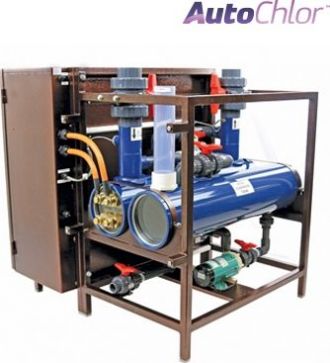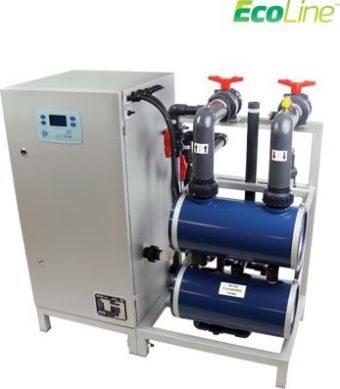Commercial
Commercial water disinfection systems for: Aquatics and Leisure Industry; Municipal Wastewater Treatment; Drinking Water Treatment; Marine Industry and Offshore; Mining Industry; Agriculture; Aquaculture; Power Industry and Cooling Water.Extensive range of commercial chlorinators AutoChlor and EcoLine is suited to a range of industry applications and can disinfect water of almost any composition from fresh water to salt water or even waste water. Chlorinators disinfect water on-site and in-line (or off-line if required) conveniently and automatically, eliminating the risk, hassle and expense of traditional chlorine storage and dosing. Using a process known as electrolysis, water passes through electrolytic cells which convert the minerals and salts present in the water into chlorine. The chlorine is then distributed directly into the water keeping it clear and germ and bacteria free and letting you bid farewell to the endless cycle of traditional chemical dosing forever. Commercial chlorinators boast extra features such as: Reverse Polarity (RP); Switch Mode Power Supply (SMPS), Genuine AIS Anodes; Built-in Acid Wash Systems; Sealed Internal Cooling; Skid Mounted Design and Flow-Switch/Pressure Relief Valves offering further value for money. Modular systems are also available for remote locations or confined spaces. |
AutoChlor - Advanced, in-line salt water chlorinatorAutoChlor is multi-award winning, in-line salt water chlorinator. It conveniently and automatically disinfects water of almost any composition, onsite and in-line, allowing you to bid farewell to the endless cycle of traditional chlorine [i] dosing. AutoChlor technology can deliver significant savings in operational and maintenance costs when compared with other disinfection systems and can be new or retrofitted and delivered as a skid-mounted pre-assembled unit or in modular format (handy for installation in remote locations or confined spaces). Whats more, AutoChlor is workplace health and safety friendly. Its compact, robust design and self chlorine generation helps to eliminate the risk of chemical handling and chemical contamination to staff, customers and the environment. The applications for AutoChlor are endless however AutoChlor is particularly suited to the Aquatics and Leisure Industry namely: Aquatic Facilities, Water Theme Parks, Municipal Lagoons and Pools and Hotels and Resorts. Reccomended TDS level for AutoChlor commercial operation: 2,500 - 35,000 ppm |
|
EcoLine - Revolutionary in-line fresh water chlorinatorEcoLine has caused a revolution in the water disinfection industry. EcoLine conveniently and automatically disinfects water on-site and in-line in fresh water and at approximately 75% lower salinity levels than traditional salt water systems! Historically, commercial scale inline chlorine generation via electrolysis was only considered viable in high salinity water (with TDS levels of around 4,500ppm or more). AIS has smashed the in-line chlorination barrier with EcoLine capable of disinfecting commercial quantities of fresh water, quickly and efficiently, at TDS levels of around 1,200ppm. For water of even lower salinity an AIS TDS Top-up may be all that is required to start EcoLine operation. EcoLine allows you to bid farewell to the endless cycle of traditional chlorine[i] dosing and can significantly improve air and water quality as well as eliminate the risk of chemical handling and potential contamination to staff, customers and the environment. The applications for EcoLine are endless however EcoLine is particularly suited to the Aquatics and Leisure Industry (namely Aquatic Facilities, Water Theme Parks, Municipal Lagoons and Pools and Hotels and Resorts), Drinking Water Treatment, Municipal Wastewater Treatment and Agricultural Industry. Recommended TDS level for EcoLine operation: 1,200 - 2,500 ppm |
|
*TDS stands for total dissolved solids and represents the total concentration of dissolved substances in water. Dissolved substances can include minerals, salts, metals and organic matter and can originate from natural sources and as a result of human activities. PPM is the amount of TDS in a given volume of water, expressed in units of parts per million (ppm).

